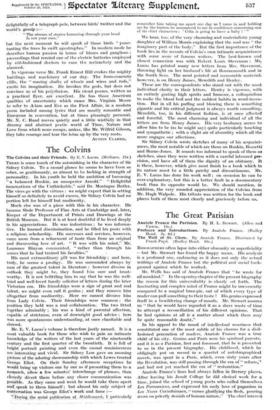The Colvins
The Colvins and their Friends. By E. V. Lucas. (Methuen. 21s.) THERE is some touch of the astonishing in the character of Sir- Sidney Colvin. To a casual glance he seems to have been so sober, so gentlemanly, as almost to be lacking in strength of personality. In his youth he held the ambition of becoming_ " a balanced Ruskin, an unsuperior Arnold." " Delightful incarnations of the Unthinkable," said Dr. Montague Butler._ The vices go with the virtues : we might expect that in setting himself so definitely to avoid excess, Sir Sidney Colvin had no portion left for himself but mediocrity.
Much else was of a piece with this in his character. He became Slade Professor of Fine Arts at Cambridge and, later, Keeper of the Department of Prints and Drawings at the British Museum. But it is at least doubtful if he lived deeply in his appreciations. He was industrious ; he was informa- tive. He learned discrimination, and he filled his posts with a religious scholarship. His successes and services, however, came more from a refinement of taste than from an original and discovering love of art. " It was with his mind," Mr. Laurence- Binyon commented, " rather than through his senses that he had trained his faculties."
His most extraordinary gift was for friendship ; and here, truly, he seems a prodigy. He was surrounded always by men of the greatest talent in literature : however diverse in outlook they might be, they found him sure and trust- worthy. It is not belittling him to say that he was the well- tried and well-loved family solicitor of letters during the later Victorian era. His friendships were a sign of great and real talent, we might even call it genius ; and they remove him altogether from mediocrity. Here we cannot divorce hiin from Lady Colvin. Their friendships were common ; the position they held was a real collaboration. The two fitted together admirably ; his was a kind of parental affection, capable of strictness, even of downright good advice ; hers was more spontaneous understanding, at once charitable and' shrewd.
Mr. E. V. Lucas's volume is therefore justly named. It is a most valuable book for those who wish to gain an intimate knowledge of the writers of the last years of the nineteenth century and the first quarter of the twentieth. It is full of bright portrait painting and even the casual reminiscences are interesting and vivid. Sir Sidney Low gave an amusing picture of the adoring showmanship with which Lewes treated George Eliot. On their Sunday afternoon receptions he would bring up visitors one by one as if presenting them to a monarch, allow a few minutes' interchange of phrases, then cleverly divert them before any closer communication was possible. As they came and went he would take them apart and speak to them himself ; but almost his only subject of conversation was George Eliot's work and fame :- `•` During the serial publication of .Misldlemarch, I particularly
remember him taking me apart one day as I came in and holding me by the button he announced to me in confidence concerning one of its chief characters : Celia is going to have a baby I ' " We hear, too, of the very charming and materialistic young daughter of William Morris explaining that the soul was " the imaginary part of the body." But the first importance of the book lies in the records of Colvin's own intimate acquaintance with some score of famous writers. The best-known and closest connexion was with Robert Louis Stevenson : Lucas has printed many new letters from Mrs. Stevenson, throwing light on her husband's life at Bournemouth and in the South Seas.. The most pointed and memorable material, however, is on Henry James, Meredith and Henley.
These are the correspondents who stand out with the most individual clarity in their letters. Henley is vigorous, with an entirely grating high spirits and humour, a colloquialism to make the blood boil and the saddest habits in word-inven- tion. But in all his puffing and blowing there is something gigantic and his critical judgment is always worth consulting. Meredith, too, in his different fashion, is at once affected and forceful. The most charming and individual of all the letters are from Henry James. His very hesitancy seems to allow him to be (as he might say) quite particularly touching and sympathetic ; with a slight air of absurdity which all the more engages our affections.
Sir Sidney Colvin wrote sketches of many of his acquaint. ances, the most notable of which are those on Ruskin, Rossetti and Burne-Jones. It sounds too informal to speak of them as sketches, since they were written with a careful laboured pre- cision, and have all of them the dignity of an obituary. It is these, however, which give most finish to a book which in its nature must be a little patchy and discontinuous. Mr. E. V. Lucas has done his work well ; on occasion he can be over-explanatory, but this is a better fault in a documentary book than its opposite would be. We should mention, in addition, the very rounded appreciation of the Colvins from Mr. Hugh Walpole. His tribute was written for the book and places both of them most clearly and graciously before us.






























































 Previous page
Previous page